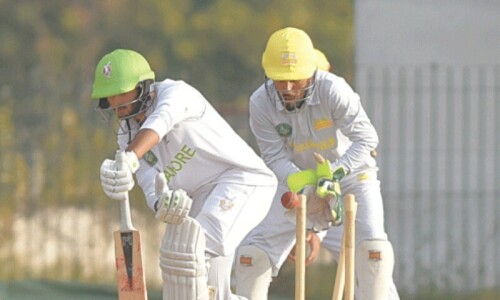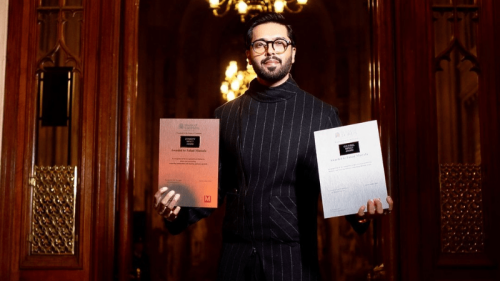The Supreme Court on Monday resumed hearing of the Panamagate case, with Jamaat-i-Islami (JI) lawyer Advocate Taufiq Asif arguing Prime Minister Nawaz Sharif's speech in the National Assembly (NA) last year was against the rules of the House.
Taufiq Asif maintained the Panamagate case is about the Sharif family, not the government. He said that NA Speaker Ayaz Sadiq allowed the PM to deliver a speech after suspending the proceedings of the Lower House, which is against the rules.
Justice Azmat Saeed advised the JI counsel to read Article 69 and argue his case according to that. Advocate Taufiq, however, maintained that the premier's speech does not fall under Article 69 as it addressed allegations levelled at Nawaz Sharif on a personal level.
Once again, the question about the PM’s speech being a part of the proceedings of the NA was raised by Justice Khosa.
JI’s counsel replied that the speech was not part of the assembly’s agenda that day.
The PM delivered his speech on a Monday whereas Tuesday is the designated day for house proceedings regarding private matters, Taufiq argued, adding that if the PM had to address a personal matter in his speech, he should have done it on Tuesday.
Justice Sheikh Azmat Saeed asked the JI lawyer if the NA speaker does not have the right to suspend house proceedings and give the prime minister permission to conduct his speech.
"Was the prime minister not given the permission to conduct his speech by the speaker?" Justice Saeed enquired.
Justice Gulzar asked if anyone had objected to the PM’s speech in the National Assembly on that day, to which Taufiq replied that the Opposition walked out of the house in response to the PM’s speech.
Justice Gulzar enquired if Prime Minister Nawaz Sharif’s speech was stricken from the National Assembly’s record. Advocate Taufiq said that the speech is part of the record but the right of immunity does not extend to it.
The JI's counsel then requested the NA speaker be asked to hand the speech over to the court.
The judges asked if the transcript of the speech attached with Pakistan Tehreek-i-Insaf's evidence was incorrect.
Justice Asif Saeed Khosa observed that if none of the parties in the case had any reservations regarding the speech then why should the record be summoned.
Taufiq maintained that there may have been some errors while translating the speech.
Justice Ijazul Hassan observed that the PM's speech had been delivered in Urdu, to which the lawyer argued that the speech is an important part of evidence against Nawaz Sharif.
The bench concluded that the speech provided as evidence earlier would be considered accurate.
The JI counsel argued that the prime minister first said that that everything was clear but is now asking for immunity. He also stated that Nawaz Sharif had separated his case from his children's and even changed his counsel.
He observed that no money trail had been provided by the prime minister's counsel regarding the London flats.
On this line of argument, Justice Khosa remarked that it seemed as though the JI counsel was trying to buy more time by repeating old arguments. The bench instructed Advocate Taufiq Asif to wrap up his arguments within the next hearing on Tuesday.
During Friday's hearing, the five-judge bench hearing the case wondered whether the PM's May 16, 2016, speech was part of the house business agenda.
“Is it proper or is it admissible for the prime minister to appear in the National Assembly to explain about his family business in his speech,” asked Justice Ijazul Hassan.
The observation came after the JI counsel argued that the PM's speech was not related to the day-to-day proceedings of the National Assembly. Rather, Taufiq said, it should be construed as something of personal nature because the premier used the august floor of the house to explain his family affairs.
The JI's counsel maintained that the prime minister, through his speech, had unveiled nothing about any state policy on terrorism, National Action Plan, welfare of people or anything about the Quetta incidents.
Rather, he offered and explanation of a personal nature, the counsel said, adding that neither was the speech part of the agenda of the lower house that day, nor was there any finding or ruling of the speaker to dispense with the house agenda, allowing the premier to make the speech.
Justice Asif Saeed Khosa who heads the bench, raised a question about whether the PM's speech was part of the house proceedings. The JI's counsel maintained that the speech was not part of the assembly's agenda that day.
The right to immunity can only be given in light of the law, Taufiq argued.
In today's hearing, Taufiq remarked there should be a ban on television talk shows and news discussions about the Panamagate case.
In reply to this, Justice Khosa said that a lot has been done and now everyone should wait for the court's judgement before discussing it on the media.
Advocate Taufiq observed that the way the media portrayed how questions were raised in court on Friday make it look like a judgement had already been passed, to which Justice Khosa responded that questions are asked for the purpose of clarification and are not a verdict.











































